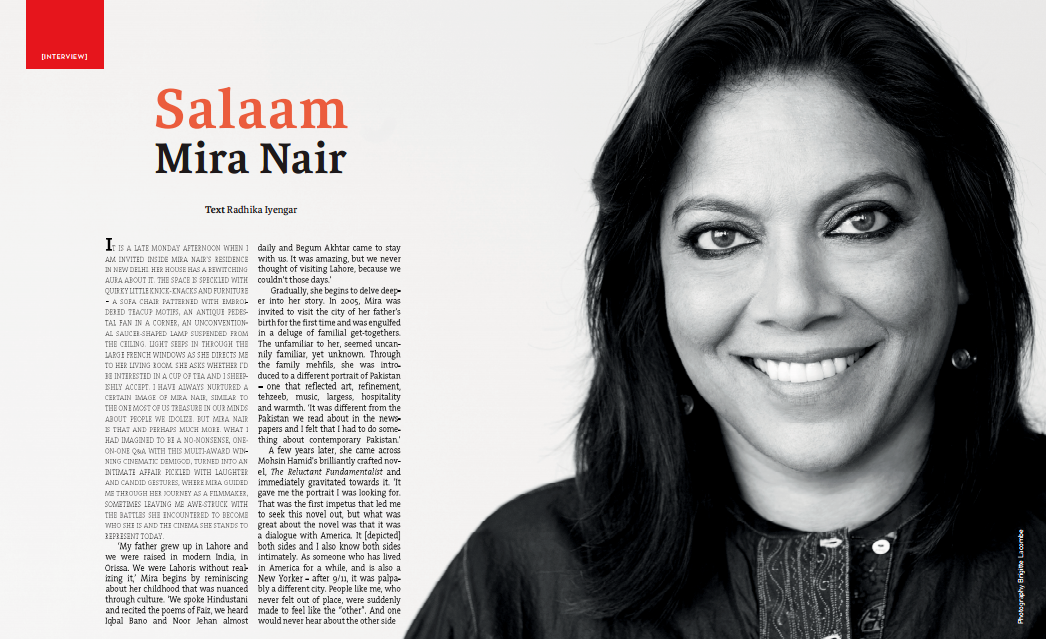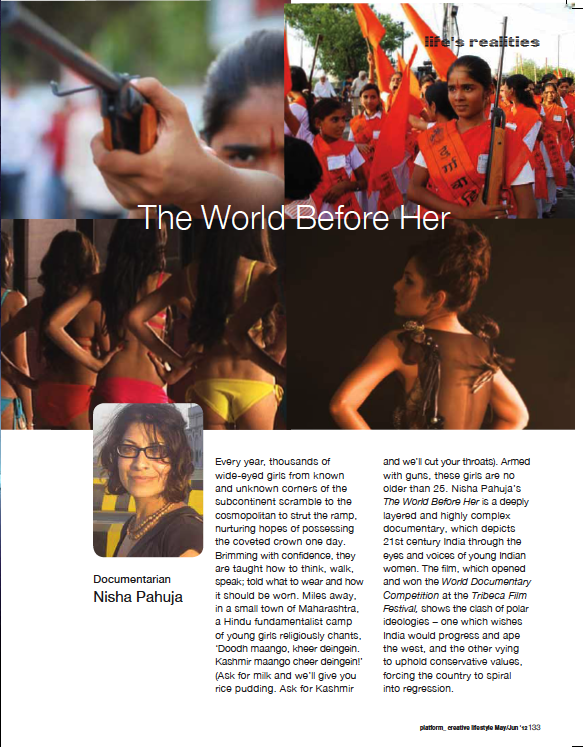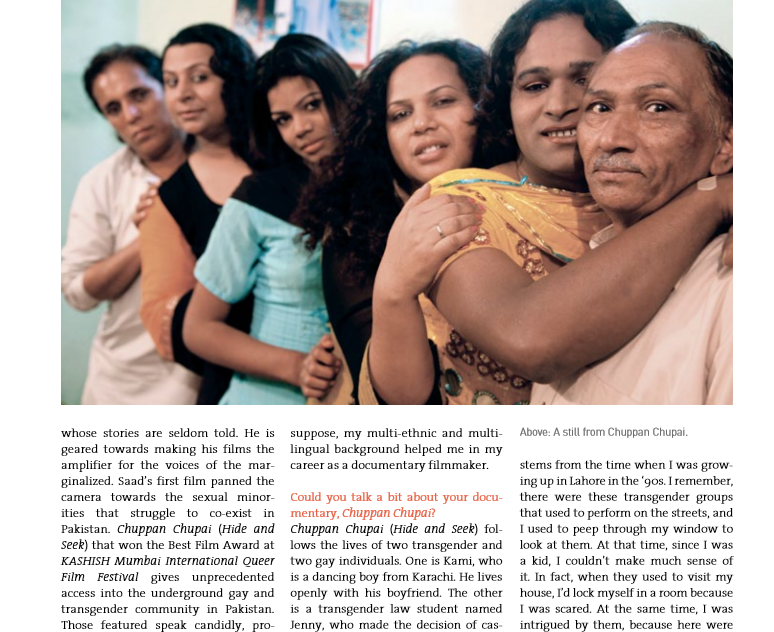Oscar winning documentary filmmaker: Sharmeen Obaid-Chinoy
An Academy and Emmy Award winner and also the first non-American to receive the Livingston Award for Young Journalists, Sharmeen Obaid-Chinoy is not your ordinary filmmaker. TIME magazine named her one of the 100 most influential people in the world in 2012. Obaid-Chinoy is one of the few documentarians across the globe who decided to risk it all and uncover some of the darkest, well-kept secrets of society and bring them to light.
Born in a country riddled with internal conflicts, where men reined and women bowed their heads in deference, Obaid-Chinoy’s ideological battle with her homeland began young. The eldest of six children–five sisters and a brother, she grew up in Karachi, Pakistan, where she was brought up in an honest and outspoken household, which inculcated knowledge and prompted thought and reason. At 14, she began writing for a local newspaper. She wrote to liberate unorthodox ideas and talk about disconcerting panoramic issues that seethed in Pakistan’s underbelly.
However, she soon realised that the society she wrote so diligently to inform, would rarely appreciate having a mirror held up against it. At 17, Obaid-Chinoy wrote her first piece of investigative journalism, which landed her in trouble.
“I had written a piece on the children of the feudal lords in Pakistan who used guns to terrorise other teenagers, and because I was a teenager then myself, I connected with the issue. When the piece came out however, people were not very happy about it. As a result, I had my name spray-painted with profanities across several neighbourhoods,” she recalls.
To be a young woman in Pakistan, or any country for that matter, and to have your name painted across walls in the most appalling manner could leave any 17-year-old scarred. Obaid-Chinoy however, remained undeterred. She continued to write and three years later, packed her bags to pursue higher education in the United States.
In September 2001, when America shook and rattled as the cloud of terrorism shrouded the country, Obaid-Chinoy realised that that the power of visual media superseded the power of ink. It was then that she decided to make films that dealt with chronic issues inherent in society. With an irrepressible urge to excavate and narrate Pakistan’s saga, she returned to her country the same year to find her first story lurking in the Afghani refugee camps in Karachi.
With no prior experience but a documentary proposal in tow, she returned to the United States where she pitched her story via emails to 80 news establishments–all ignored, overlooked or rejected her proposal. Eventually, through resilience and sheer luck, Bill Abrams, the president of New York Times Television was impressed by Obaid-Chinoy’s dedication and decided to give her a chance. She received a 14-day crash course in filmmaking basics and was then sent off to Pakistan in 2002 to shoot her first documentary, Terror’s Children. The film followed eight Afghan children who were living as refugees in Karachi, and explored how some of them eventually ended up finding their way to the madrasas. The documentary went on to win the Overseas Press Club Award and the American Women and Radio and Television Award.
Stills from Sharmeen Obaid Chinoy's documentaries
Since then Obaid-Chinoy has been applauded for having made 16 engaging, eye-opening documentaries–all have individually bagged top journalist awards. However, she received her first big global recognition through Pakistan: Children of Taliban, for which she was honoured with an Emmy in 2010. Exploring the overture of the Taliban culture in Pakistan, the film navigates through the lives of young Pakistani children and their transformation into becoming child suicide bombers.
“At the end of 2007, I had just finished a film for CNN called, Lifting the Veil which is about women in Afghanistan. I had seen what had happened to Afghanistan through years of war, and once I returned to Pakistan, I realised I didn’t want my country to become another Afghanistan,” says Obaid-Chinoy. “I noticed that suicide bombing had peaked and how younger and younger people were being co-opted into war–but no one was talking about the issue. No one was talking about what prompts these young men to go and become suicide bombers. It was important for me then, to look into this subject.”
When she began researching on the story, Obaid-Chinoy was met with several raised brows, where she was told such an issue did not exist in Pakistan. “Just like they say about all the other issues before I go ahead make a film on them,” she winks, “but I have to say, as soon as the film came out, the Pakistani army acknowledged that indeed, the problem of child suicide bombers did exist. And so that got people talking about the subject and the film did tremendously well, it played everywhere in the world, but more importantly, it started a conversation and that’s what I want my films to do. I want Pakistan to have a conversation.”
The next documentary she made however, did much more than start conversations. It made history. In 2012, Obaid-Chinoy won the Academy Award for Saving Face, making her the first Pakistani woman ever to receive such an honour.
Back in 2010, she was approached by filmmaker, Daniel Junge to co-document the escalating rise of acid crimes in Pakistan. He was following the story about a British-Pakistani doctor, Dr. Mohammad Jawad, a renowned and successful plastic surgeon who was coming back to his country to work on the acid violence survivors, performing free surgeries for them with the help of Islamic Help, an organisation based out of Birmingham. Although apprehensive at first about working with another filmmaker, Obaid-Chinoy quickly found herself intrigued by the subject and was on board immediately after having seen the film’s first footage, “Daniel had already taken one trip to Pakistan and sent me a few minutes of the film that he had shot. When the first image came on my screen, I remember saying to myself, ‘This is the film I want to make.’”
Saving Face tracks the journey of two women, Zakia and Rukhsana who are acid violence survivors. It poignantly depicts the plight of the Pakistani women and the choices they are left with after being disfigured by angry husbands, jilted lovers or ‘dishonoured’ family members. So while some women choose to fight and take legal action, others don’t.
With the intention of unearthing problematic issues that run rampant in her country, Obaid-Chinoy is drawn towards subjects that irk her. “My topics are very wide and wide-ranged. They are not connected to each other except that they’re all about the injustices that man does to another man in the name of religion, ethnicity and politics. And due to these issues, it has become a very polarised world. And unless we talk about these issues, we can’t find solutions. The ostrich mentality just does not work, and it shouldn’t anymore.”
Her next project, Ho Yakeen is a television series filmed in collaboration with Coca-Cola about people who are inspiring a change in Pakistan from the ground up. She is also developing a film about the Bangladeshi female peacekeepers in the Congo, along with introducing Pakistan to its first animated, super-hero series called, Teen Bahadur. The series is about three young children who get powers and change their community.
With an impeccable record of enlightening the world by introducing Pakistan’s carpet-hidden atrocities, there is a percentage of people who object to her decision to do so. Obaid-Chinoy however, pays little heed to them, “There will always be detractors, but my conscience is clear and I have a very strong track record of very powerful human-rights films around the world. And I honestly feel that criticism are just murmurings that take place. Of course, it affects me, and I feel saddened by it, but then I look at the greater fight–we as Pakistanis, we need to fight back and push hard. If we continue to do that, change will come and I just think of this as the process of change, and eventually the good will outwit the bad.”





